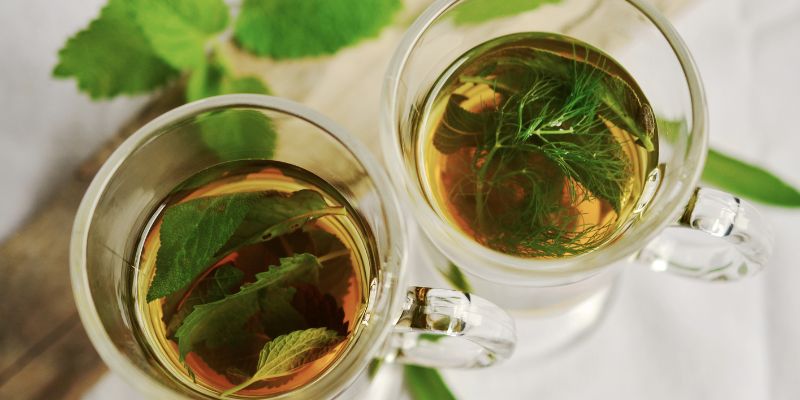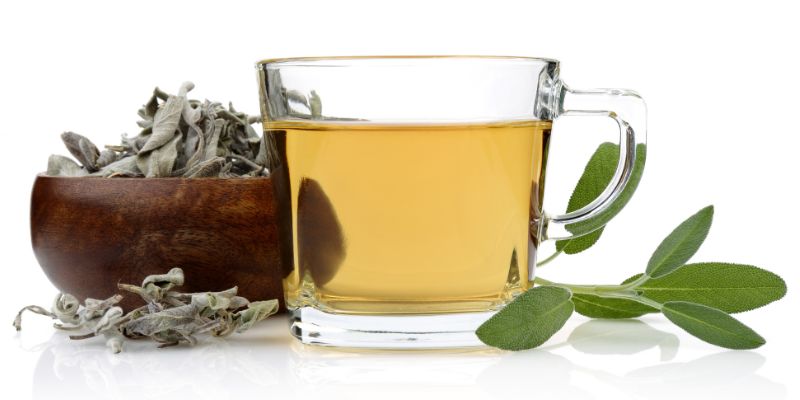Sage has been a star in kitchens and medicine cabinets for centuries. But have you ever explored the world of sage tea? This simple drink, made by steeping the leaves in hot water, boasts a unique taste and a surprising range of potential health benefits. Let's dive into the fascinating story of sage tea, from its origins to its potential perks and benefits. Plus, everything you need to know before brewing a cup.

About Sage: The Facts About Sage Tea
Sage, pronounced "sayj," is a fragrant herb from the mint family. It thrives in warm, sunny climates and is originally from the Mediterranean region. Sage has a reputable history: used in everything from delicious dishes to religious ceremonies.
Did you know the word "sage" itself comes from the Latin word "salvia," meaning "to heal"? Throughout history, different cultures have assumed sage to have potential healing powers. The ancient Romans used it for everything from sore throats to wounds, while the Egyptians believed it held the key to immortality! Even in the Middle Ages, sage was considered a powerful herb, used to ward off evil spirits and even plague!
But we’ve moved on from that for a good 1000 years. Today, sage tea is enjoyed worldwide, but some regions hold a special place for this fragrant brew. In China, it's traditionally used to clear the mind and improve memory. In Italy, it's a popular home remedy for sore throats and coughs.
There's also a fascinating variety of sage, each with its subtle flavor profile.

Common sage: the most widely used variety for tea, offers a slightly earthy and peppery taste.
Spanish sage: With its silvery leaves, it boasts a more citrusy aroma, while pineapple sage, as the name suggests, offers a hint of tropical sweetness.
While we are at it, let us address one of the most common questions about sage tea: “Does sage tea make you sleepy?” Contrary to popular belief, sage tea doesn't typically induce drowsiness. Unlike some teas, sage generally won’t leave you feeling sleepy.
The Good Stuff: Potential Benefits of Sage Tea
Sage tea is more than just a comforting beverage. Packed with antioxidants and natural compounds like thujone and carnosic acid, it boasts a range of potential health benefits.
- Sharpen Your Mind: Studies suggest that sage tea might enhance memory and cognitive function, particularly in older adults. This potential benefit is linked to acetylcholinesterase inhibitors, which may help protect brain cells and improve memory pathways.
- Menopausal Relief: For women experiencing the transition of menopause, sage tea might offer a soothing solution. Research indicates that sage may help alleviate hot flashes and night sweats, common symptoms that disrupt sleep and daily life.
- Oral Health Hero: Sage's anti-inflammatory properties come to the rescue regarding oral health. It may help soothe sore throats and mouth ulcers thanks to its potential to reduce inflammation and fight bacteria. Its natural antiseptic qualities might freshen breath, making it a refreshing choice after a meal.
- Balancing Blood Sugar: Some studies suggest that sage may play a role in managing blood sugar levels. This potential benefit, particularly interesting for individuals with type 2 diabetes, might be attributed to compounds in sage that may help regulate insulin sensitivity.
- Heart Health Support: While further research is needed, some studies have shown that sage tea might positively impact cholesterol levels. This could potentially contribute to reducing the risk of heart disease.
It's important to remember that these potential benefits are promising, but individual experiences and effectiveness may vary. Consult your healthcare professional before incorporating sage tea into your routine, especially if you have any underlying health conditions or are taking medications.
Important Information: Side Effects of Sage Tea
While generally safe for most healthy individuals in moderate amounts, sage tea can pose certain side effects for specific individuals and circumstances. It's essential to be aware of these before enjoying a cup:
- Pregnant and breastfeeding women: Sage may interfere with hormone regulation and should be avoided during pregnancy and breastfeeding.
- Certain medical conditions: People with epilepsy, seizures, or hormone-sensitive cancers should talk to their doctor before consuming sage tea due to potential interactions with medications or underlying health conditions.
- Excessive consumption: Drinking too much sage tea can cause side effects like tremors, dizziness, and stomach upset.
Brewing Your Own: How to Make Sage Tea
Making sage tea is a straightforward and rewarding experience. Here's what you need:
Ingredients:
- One teaspoon of dried sage leaves (or 1-2 fresh leaves)
- One cup of boiling water
- Honey or lemon (optional)
Instructions:
- Steep the sage leaves in hot water for 5-10 minutes, depending on how strong you like your tea.
- Strain the tea and enjoy it warm.
- You can add honey or lemon for additional flavor or to soothe a sore throat.
Sage tea can be enjoyed hot or cold. Experiment with different steeping times and additions to find your perfect cup.
Daily Dose: Drinking Sage Tea Every Day
While sage tea offers various potential benefits, it's crucial to practice moderation. Daily consumption is generally safe for most healthy individuals, but it's essential to be mindful of possible side effects and consult a healthcare professional if you experience discomfort. Remember, sage tea isn't a substitute for medical care, and while these benefits sound promising, more research is needed to confirm their effectiveness and establish safe and effective dosages.
Summary
Sage tea offers a unique combination of flavor and potential health benefits. Its antioxidants and anti-inflammatory properties might contribute to improved memory, menopausal relief, oral health, blood sugar control, and heart health. However, exercising caution is vital, especially for pregnant women, individuals with specific health conditions, and those consuming excessive amounts. Whether you're seeking a calming beverage or exploring natural remedies, sage tea is an intriguing option. Stay informed, consult a healthcare professional if needed, and enjoy this herbal brew responsibly.







